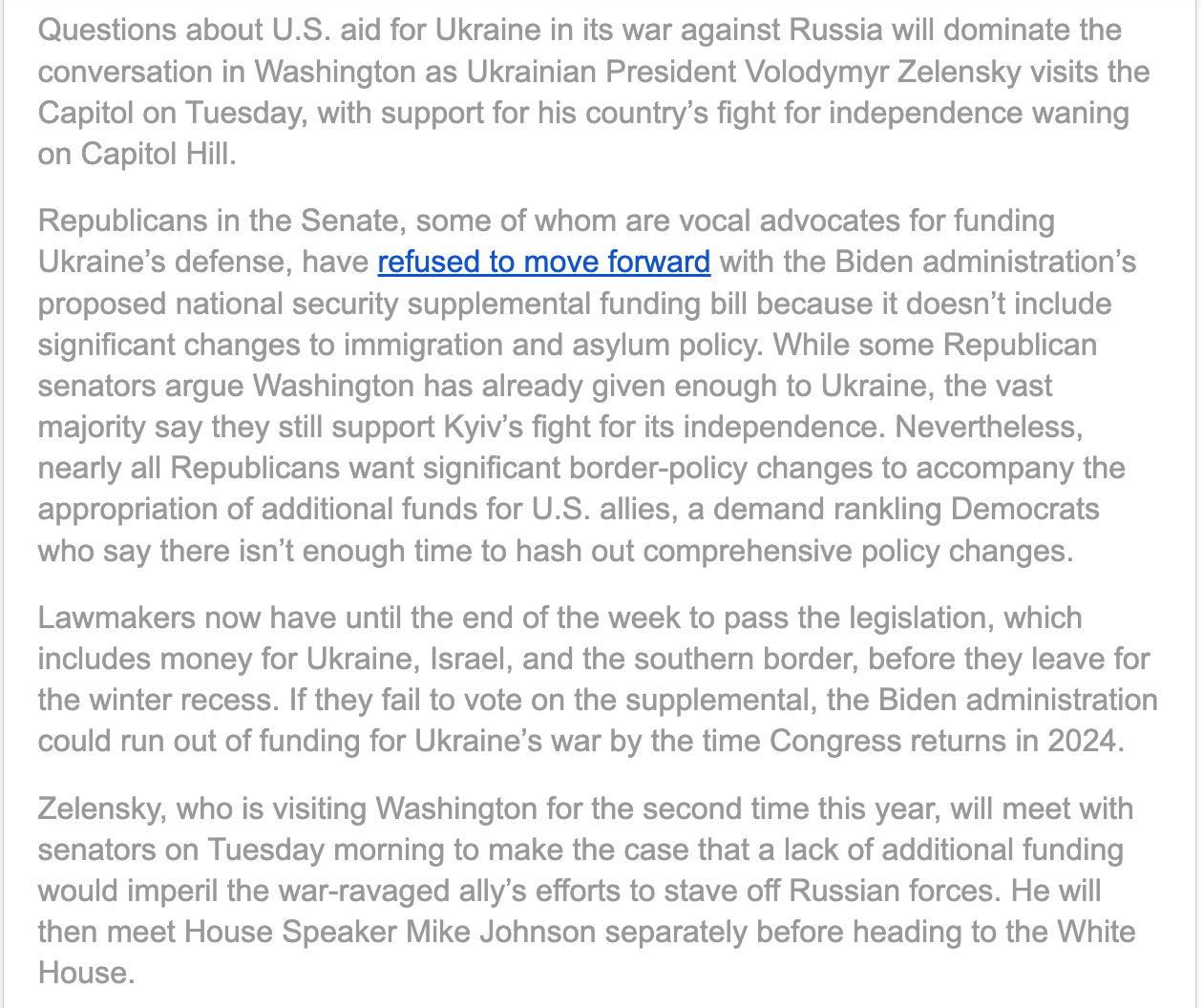Another week went by in Washington, and Congress did not appropriate more funding to help Ukraine fight for its independence against Russia’s invasion. I am starting to sound like a broken record. Every week I say the same thing.
On Tuesday morning, lawmakers were sure they would leave for the winter recess without passing the Biden administration’s requested national security supplemental funding bill, which includes money for Ukraine, Israel, Taiwan, and the U.S. southern border. That was despite a visit by Ukrainian President Volodymyr Zelensky on Tuesday morning.
But by Tuesday night, the White House got involved, and lawmakers said there was “substantive progress” on negotiations. I started to think maybe they were going to get this done.
Still, by Thursday, no policy proposals were on paper. Lawmakers refused to outline the parameters of the negotiations, although Sen. Ben Cardin told me he thinks that funding for immigration courts, needed to reduce the sometimes decades-long wait to resolve an asylum claim, is part of the discussions.
Lawmakers went home for the weekend. Democrats said they were coming back on Monday to keep working, even though they were scheduled to be out of town until 2024. Many Republicans said coming back was pointless, and they refuse to return to Washington to twiddle their thumbs as uncertain negotiations drag on.
It’s very unclear what will happen. Will they pull off a last-minute hail mary by the end of the week? Will everything be punted to January, the beginning of an election year, when the chances of passing anything get more difficult and a government shutdown looms? Only time will tell.
I spent a lot of time this week writing about this. You can see my work below.
In the meantime, I am very excited to announce that the first article in Lazo Magazine’s pluralism series is online. It’s a story by India-based journalist Junaid Kathju about a small ethnic group in Indian-controlled Kashmir that is fighting to preserve its rare language while integrating with local Kashmiris.
This journalism is possible thanks to the generous support of George Mason University’s Mercatus Center and its Pluralism and Civil Exchange program.
Here’s what Junaid wrote:
Wearing a white pheran — a long woolen cloak — and holding behind it a hot coal earthen pot known as a Kangri, 74-year-old Raja Jahangir Ali looks like any other Kashmiri.
But when he asks his daughter to bring a cup of tea for the guests, he speaks in a foreign language, giving a hint of his unique background.
Jahangir, a retired lawyer, is a member of the Burusho people, an ethnolinguistic group indigenous to Gilgit-Baltistan.
Keep Reading Lazo Magazine.
What I’m writing:
• Ukrainian President Volodymyr Zelensky’s 3rd visit to Washington failed to convince Republicans to relinquish their demands that the funding bill for Ukraine also include significant border-policy changes. That left the Biden administration scrambling to find a way to pass its proposed national-security supplemental funding bill before Congress leaves for the upcoming winter recess. This story is unlocked and free to read.
• Conversations on border security and immigration continued throughout the week. Complicating negotiations are progressives and Hispanic Democrats who adamantly oppose what they view as a one-sided trade: the permanent loss of asylum rights for a one-time appropriation to help an ally thousands of miles away. This story is unlocked and free to read.
• I spoke to Kanni Wignaraja, the assistant secretary-general for Asia and the Pacific at the United Nations Development Programme, about humanitarian challenges in Myanmar and Afghanistan.
My weekly news blurbs:
From Monday:
From Thursday:
What I’m reading:

• The European Union opened membership talks with Ukraine and Moldova and granted Georgia candidate status, taking an important step forward in all three countries’ long path to future EU accession. The BBC has the story. Hungarian Prime Minister Viktor Orbán — who threatened to derail Ukraine’s accession bid — left the room when the vote took place.
• Hungary blocked $55 billion in European Union aid for Ukraine, the BBC reports. The aid negotiations will continue into the new year.
• Ukrainian President Volodymr Zelenskyy had a brief but sharp-looking meeting with Hungary’s Prime Minister Viktor Orbán at the inauguration of Argentina’s new president, the BBC reports.
• Allies of Hungary’s Prime Minister Viktor Orbán held a closed-door meeting with Republicans in Washington to push for an end to U.S. military support for Ukraine, the Guardian learned. Members of the Hungarian Institute of International Affairs and staff from the Hungarian embassy in Washington participated in an event hosted by the conservative Heritage Foundation.
• The Hungarian parliament adopted a so-called national sovereignty law to fight foreign interference. A new authority will have investigatory powers and be able to ban foreign-financed groups or parties and punish breaches with prison time. Human rights and media freedom advocates say broad wording could imperil activists and the press.
• Bulgaria said it would lift taxes on Russian gas transiting its territory after Hungary threatened to block its bid to join the EU’s border-free Schengen zone unless it abolished the charges, the Financial Times reports.
• Austria, which has led the opposition to Romania and Bulgaria joining the Schengen open-travel area, said it would relent in exchange for tighter security at the EU’s external border, Reuters reports.
• Across the European Union, a solid majority of people, 63 percent, favor Ukraine joining the Union “in the coming years,” according to a new poll. Support was strongest in Spain, followed by Poland.
• Lawyers for jailed Russian opposition leader Alexey Navalny said they have lost contact with him and have been told he is not at either of the penal colonies where he was believed to be held, CNN reports.
• Finland closed its border with Russia again, just two days after initially reopening it, the New York Times reports.
• Poland’s new Prime Minister, Donald Tusk, took office along with his Cabinet members, marking the end of eight years of rule by the conservative Law and Justice party, the Associated Press reports.
• Poland’s newly appointed Prime Minister Donald Tusk vowed to rally Western support for Ukraine as it continues to defend itself against Russia’s ongoing invasion, the Atlantic Council writes.
• A far-right Polish lawmaker, Grzegorz Braun of the Confederation party, described Hanukkah as “satanic” and used a fire extinguisher to put out Hanukkah candles in Poland’s parliament during an annual celebration, Reuters reports.
• Serbs go to the polls for a snap general election called by President Aleksandar Vučić. But the outcome is essentially a done deal, writes Una Hajdari for Politico Europe. Despite a united opposition — and a particular threat to Vučić’s Serbian Progressive Party (SNS) in Belgrade’s mayoral race — there is little prospect the SNS will lose.
• Slovakia unblocked the road crossing with Ukraine, which will allow the movement of trucks across its border, Reuters reports.
• German prosecutors charged 27 far-right extremists — accused of being members of the Citizens of the Reich movement — with planning a coup to overthrow Germany’s democratic political system, the BBC reports.
• The Israeli Defense Forces are searching and detaining hundreds of Palestinian men in and around Gaza City, raising concerns among human rights groups that prisoners are being mistreated, the Wall Street Journal reports. Images circulating online — released by Israel — appear to show scores of men stripped down to their underwear.
• Israel used U.S.-supplied white phosphorus in southern Lebanon, according to a Washington Post analysis of munitions fragments from October shelling, in which at least nine civilians were injured, the Washington Post reports.
• U.S. Secretary of State Antony Blinken privately told Israel during his most recent visit that the U.S. administration wants them to wrap things up by the end of the calendar year, several sources told The Economist.
• Israeli Prime Minister Benjamin Netanyahu said in a video message that “international pressures” will not stop Israel from continuing the war against Hamas.
• The New York Times analyses Israeli Prime Minister Benjamin Netanyahu’s longtime policy of encouraging funding for Hamas.
• Israel said it helped foil an Iranian-ordered attack against Israelis and Jews in Cyprus, Reuters reports. The statement said that Israel was “troubled” by what it saw as Iranian use of Turkish-controlled northern Cyprus “both for terrorism objectives and as an operational and transit area.”
• Argentina’s new far-right president, Javier Milei, warned that “there is no money” and recommitted the country to a program of austerity measures, the BBC reports.
• The government of Guyana agreed to join bilateral talks with Venezuela over the rising territorial dispute of Esequibo, the Associated Press reports.
• A U.S.-China military hotline has not been restored, a month after the presidents of the two countries agreed to resume direct communication between military counterparts, NBC News reports.
• The group ASEAN Parliamentarians For Human Rights wrote an open letter to parliaments around the world, raising grave concerns over the human rights situation in Cambodia and serious democratic threats in the upcoming 2024 Cambodia senate election.
• Baluch militants attacked a police station in the province of Sistan-Baluchestan in southeastern Iran, killing 11 security persons and injuring many more, according to state-run media. Reuters has the story.
• A South African court ruled that President Cyril Ramaphosa’s coronation of the new Zulu king last year was “unlawful and invalid,” following a legal challenge by the king’s half-brother who claimed he is the rightful heir to the throne, the BBC reports.
• Visitors to Kenya “from any corner of the globe” will no longer “carry the burden of applying for a visa to come to Kenya,” Kenyan President Wiliam Ruto said. “Kenya has a simple message to humanity: Welcome Home!” Ruto said. Reuters has the story.
You can write to me for any reason: c.maza@protonmail.com.









